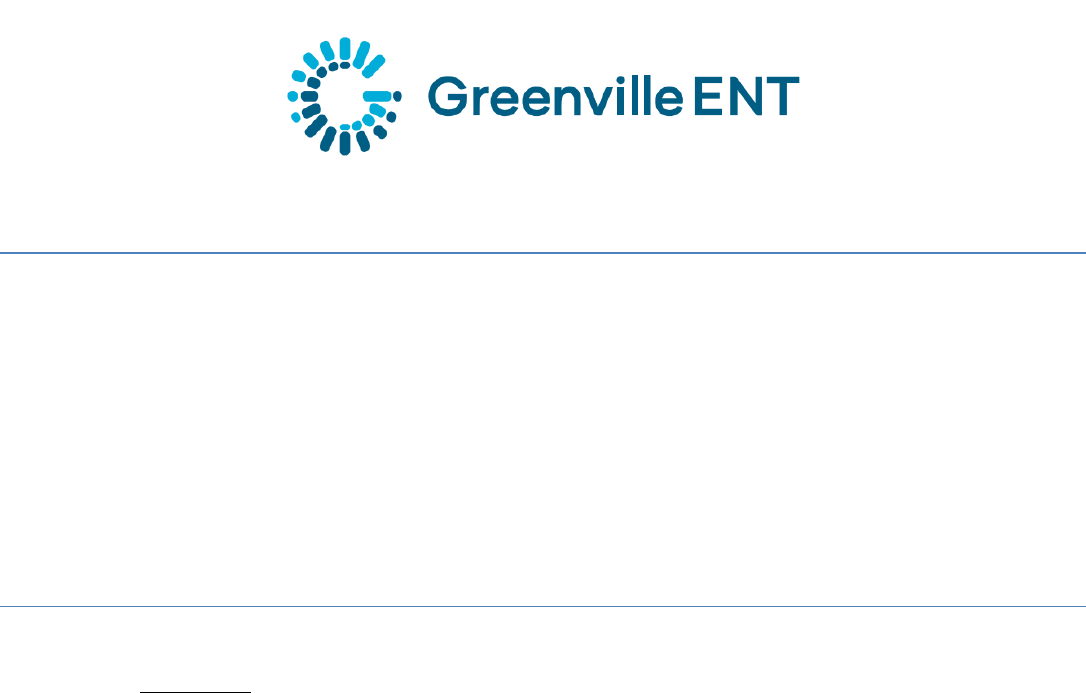
Using Your Voice After Surgery
The first days and weeks immediately following surgery are the critical period for vocal fold recovery. Proper care allows
your vocal folds to heal rapidly and decreases the risk for further injury to your vocal folds.
It is very challenging not to talk or otherwise use your voice but following these recommendations will help your vocal
folds heal faster and will give you the best result from your surgery. Remember, 1 hour of voice rest alone saves the
vocal folds from thousands of vibrations. They need rest to heal properly.
While you are recovering, be sure to drink lots of water (at least 64 ounces per day). This also helps to promote healing
of the vocal folds.
First few days after surgery = Total Voice Rest:
- Complete the number of days of total voice rest prescribed by your ENT physician: _________. Total voice rest
means NO TALKING.
- No whispering, mouthing words, whistling, laughing, crying, groaning, holding your breath, lifting heavy objects,
singing, coughing, or throat clearing.
- If you feel the urge to clear your throat or cough, swallow hard with your saliva or take a sip of water.
- How do I communicate with Total Voice Rest?
- You will need to have another way to communicate besides speaking. You can use:
▪ Pen and paper
▪ Small dry erase board
▪ Email
▪ Texting
▪ Text-to-speech apps on a smart phone
• Android Apps: Ivona Text-to-speech HQ (free); Google TTS (free); SVOX Pico (free);
Samsung TTS (free on Samsung devices); Classic Text to Speech Engine ($2.99); CereProc
($1.60); Loquendo TTS Susan ($ 5.36)
• Apple Apps: Speak- Text to Speech (free); SpeakPad (free); Voice Generator (free);
Speak It! Text to Speech ($1.99); Voice Reader Text to Speech ($1.99); Speak and Read
to Me- Text to Speech ($.99)
▪ Gestures, pointing, charades.
▪ Change the message on your voicemail saying you will not be able to talk for several days.
▪ Find a means of emergency communication such as a whistle, foghorn, etc. [there are air horn
apps available on your smartphone- Air Horn LOUD (free); Pocket Air Horn (free); Bells and
Whistles (free)].
- Consider ordering a Vocal Rest button to wear on your shirt ($4.70 from amazon.com or zazzle.com/1-888-892-
9953)

After total voice rest: Starting to use your voice again.
- Start using your voice slowly and delicately following surgery. You will use a “confidential” or quiet voice (see
below). You will start by talking for a very short amount of time each day, and then you may talk for a little
longer each day, as desired.
- These amounts are not meant to be done all at once. Your total talking time, spread out over the entire day,
should NOT exceed the amounts listed below. For example:
- Day 1: 10 minutes total talking time using a confidential voice (5 min in the AM/ 5 min in the PM)
- Day 2: 20 minutes total talking time using a confidential voice (10 min in the AM/10 min in the PM)
- Day 3: 40 minutes total talking time using a confidential voice (20 min in the AM/20 min in the PM)
- Day 4: 1 ½ hours total talking time using a confidential voice (45 min in the AM/45 min in the PM)
- Day 5: 3 hours total talking time using a confidential voice (1 ½ hrs in the AM/ 1 ½ hrs in the PM)
- Day 6: 6 hours total talking time using a confidential voice (3 hrs in the AM/3 in the PM). You may now start
using the phone again.
- Days 7-14: Normal amount of talking still using confidential voicing.
- Days 14+: Return to normal loudness and amount of talking (Still no yelling, singing, or talking over noise until
cleared by your speech-language pathologist.)
- As you begin using your voice again, it is very important that you follow these guidelines:
- Do not try to talk over noise (radio, TV, restaurants, etc) - Do not yell.
- Do not use a loud voice - Do not sing.
- Do NOT whisper - Do not throat clear/cough.
- No phone use for the 1
st
week (after total voice rest) - No singing until the 4
th
week.
- Confidential Voice: During the first two weeks of using your voice again, use a “confidential voice”. This is the
kind of voice you would use to talk to someone who is standing very close to you, when you are telling a secret,
or when you are talking in a library or church and not trying to disturb other people. This is NOT a whisper.
- The purpose of this voice is to allow the vocal folds to come together very, very gently so they will
continue to heal.
- Tips to remember:
▪ Use a soft, breathy voice
▪ Don’t try to be loud
▪ You will need to take more breaths as you talk
▪ Do NOT whisper
- At any stage during your recovery, rely on how your voice feels as a guide for continuing or stopping an activity.
Don’t try to make your voice sound perfect right away.
- Your voice will likely be hoarse to some degree during the first few weeks after surgery.
- Make sure your throat feels easy (not strained or tired). If your voice feels tired; rest it.
- If your Speech-Language Pathologist has given you resonance exercises, please complete those daily.
Contact your ENT if your voice suddenly gets worse anytime during recovery.
